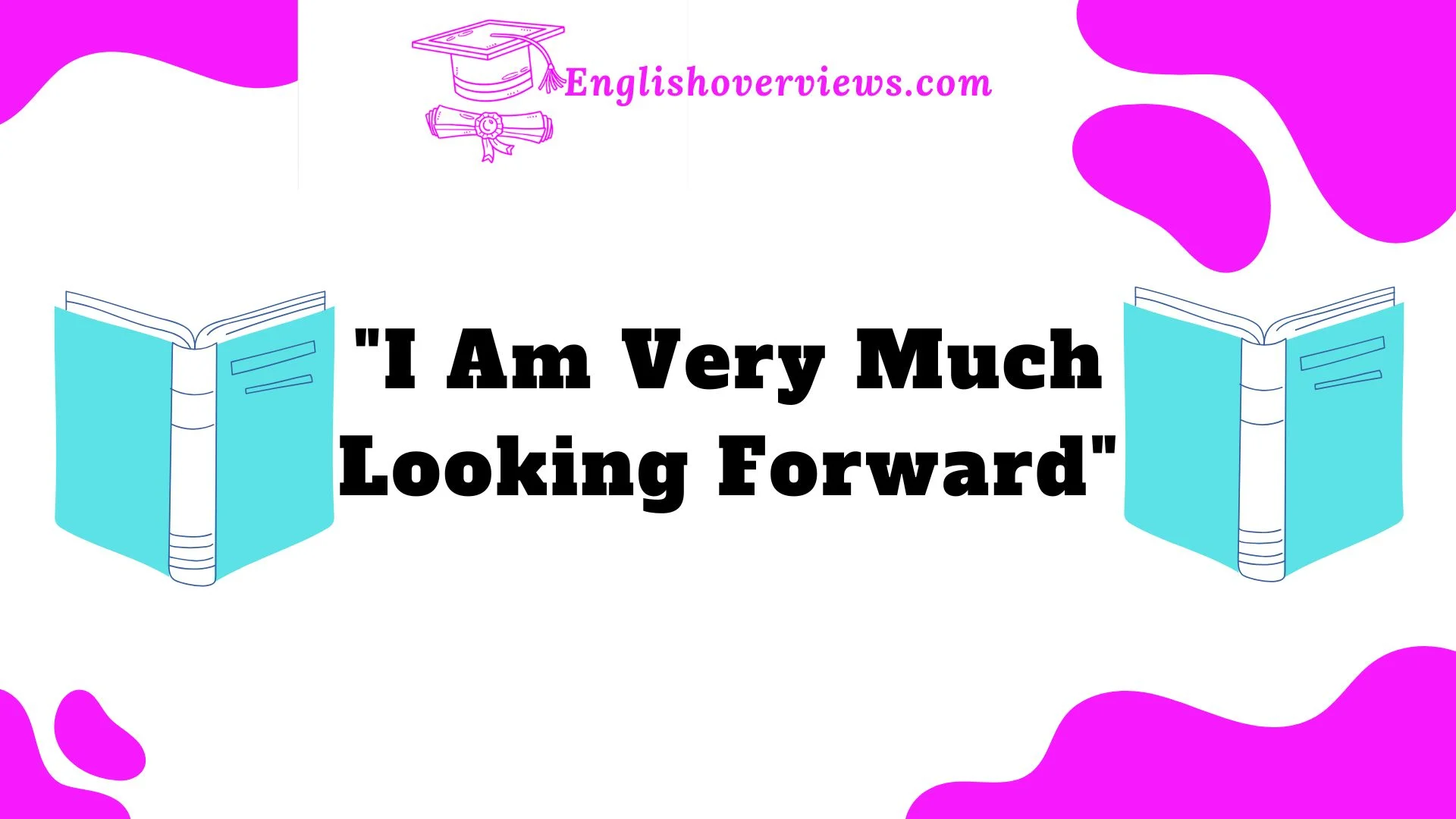“I am very much looking forward”-it’s a phrase many of us use regularly, but is it always correct? Does it sound natural, or is it just one of those expressions that’s become a bit too common? Whether you’ve used it yourself or have heard others say it, understanding how to properly use and interpret this phrase can elevate your English language skills.
In this blog post, we’ll break down everything you need to know about the expression “I am very much looking forward,” from intensifiers to the appropriate contexts for its use.
Understanding the Role of Intensifiers in English
Before we dive into the specific phrase, let’s talk about intensifiers. An intensifier is a word that strengthens the meaning of another word-most commonly a verb, adjective, or adverb. Intensifiers like “very,” “extremely,” and “really” serve to add emphasis or intensity to your message.
For example:
- “I am very excited about the trip.”
- “The food was extremely delicious.”
“Very much” is an intensifier as well, adding an extra layer of emphasis to phrases like “looking forward”. When you say, “I am very much looking forward to it,” you’re expressing a strong sense of anticipation. However, it’s essential to remember that while “very much” amplifies your sentiment, it’s not always necessary.
Common Intensifiers in English:
- Very
- Really
- Extremely
- So
- Quite
- Fairly
While all these intensifiers can help strengthen your statements, “very much” stands out when paired with expressions like “looking forward” to emphasize a deep sense of excitement or anticipation.
The Impact of “Very Much” on Emphasizing Anticipation
When you use the phrase “I am very much looking forward”, you’re not just saying that you’re excited-you’re conveying a strong eagerness or high expectation. “Very much” in this case emphasizes the depth of that feeling.
Here’s an example:
- “I am very much looking forward to meeting you tomorrow.”
This sounds much more excited and anticipatory than just saying “I am looking forward to meeting you tomorrow.”
In formal or casual settings, using “very much” helps convey an enthusiastic tone. It’s often used in professional emails, personal conversations, and event invitations to make the statement feel warmer and more engaging.
Common Quantifiers in English and Their Usage
While intensifiers like “very much” strengthen the intensity of a statement, quantifiers deal with the quantity or scope of something. They show how much or how many of something there is. In contrast, quantifiers are more about measurement, not emotion.
Examples of quantifiers include:
- Some
- Many
- Few
- A lot
- Several
For instance:
- “I have many things to do today.”
- “There are several ways to approach this problem.”
While “very much” expresses strong feelings, quantifiers deal with countability. Understanding the difference between these two is key for clear communication in English. Using “very much” in “I am very much looking forward” gives an emotional weight to your anticipation that quantifiers do not.
Distinguishing Between “Looking Forward” and Other Expressions of Expectation
The phrase “looking forward” is often used when expressing excitement about something that’s going to happen. But it’s not the only way to express anticipation. There are several other phrases you can use, depending on the level of excitement, formality, or your personal preference.
Alternatives to “Looking Forward”:
- “I’m eager to…”
- “I can’t wait for…”
- “I’m excited to…”
- “I anticipate…”
Each of these alternatives has a slightly different nuance. For example, “I can’t wait for” suggests a higher level of impatience or excitement, while “I anticipate” sounds more formal and reserved.
The Etymology and Evolution of “Looking Forward”
When we use “looking forward”, we may not stop to think about where it comes from. The expression has roots that trace back to the 19th century.
Originally, the term “look forward” referred to an expectation of what’s ahead-both literally (like looking ahead down a road) and figuratively (anticipating future events).
Over time, the phrase “looking forward” gained popularity as a common way to express positive anticipation. It’s now seen as a versatile phrase that can fit both formal and informal contexts.
Appropriate Contexts for Using “I Am Very Much Looking Forward”
So, when should you use “I am very much looking forward”? Let’s break it down by different contexts to help you understand where this phrase fits best.
Formal Contexts:
- Business emails: “I am very much looking forward to our meeting next week.”
- Job interviews: “I am very much looking forward to the opportunity to work with your team.”
- Professional events: “I am very much looking forward to the conference.”
In these cases, “very much” adds a layer of enthusiasm and professionalism without sounding too casual or forced.
Informal Contexts:
- Casual conversations: “I’m very much looking forward to catching up this weekend.”
- Social media posts: “I’m so excited for the weekend-very much looking forward to it!”
In informal settings, “I am very much looking forward” keeps your tone friendly, approachable, and warm.
When Not to Use “I Am Very Much Looking Forward”
While “I am very much looking forward” sounds great in many situations, there are times when it might not be appropriate. Here are some scenarios where it’s better to avoid the phrase:
- When the tone doesn’t match the situation:
If you’re discussing something neutral or negative (like a dreaded meeting), saying “I’m very much looking forward to it” would sound insincere. - When it’s overused:
Using “very much” too frequently can make your speech or writing sound repetitive or exaggerated. - When it’s too formal for the context:
In a laid-back conversation with friends, using such a formal expression might sound stiff.
Alternatives to “I Am Very Much Looking Forward”
If you want to mix things up or use different expressions depending on the situation, here are a few alternatives to “I am very much looking forward”:
- “I can’t wait for…”
- “I’m excited for…”
- “I’m eager to…”
- “I’m anticipating…”
Each of these alternatives serves a slightly different tone. For example, “I can’t wait for” conveys strong impatience or excitement, while “I’m anticipating” has a more neutral and calm tone.
| Phrase | Tone | Context |
| I am very much looking forward | Enthusiastic | Formal and informal contexts |
| I can’t wait for | Eager, impatient | Casual, informal settings |
| I’m anticipating | Calm, reserved | Neutral tone, formal occasions |
Conclusion: Mastering the Use of “I Am Very Much Looking Forward”
The phrase “I am very much looking forward” is an excellent way to express excitement and anticipation, but like all language tools, it’s essential to know when and where to use it. By understanding the role of intensifiers, recognizing when it’s appropriate for formal or informal contexts, and exploring alternatives, you’ll be able to use this phrase effectively to convey your feelings with clarity and precision.
When used correctly, “I am very much looking forward” can elevate your communication and make your language sound more dynamic and engaging.
So, the next time you’re anticipating something exciting, remember: there’s a right time for this phrase, and when used properly, it will leave a lasting impression.
FAQs
Q: Is “I am very much looking forward” always correct?
A: Yes, it is grammatically correct. However, it’s important to use it in the right context to avoid sounding overenthusiastic or forced.
Q: Can I use “I am very much looking forward” in casual conversations?
A: Absolutely! It’s a friendly and warm expression that can work well in informal settings too.
Q: Are there other ways to express excitement besides “I am very much looking forward”?
A: Yes, alternatives like “I can’t wait for”, “I’m eager to”, or “I’m excited about” can add variety and tone to your speech.

Alyan Ashraf is the creative mind behind English Overviews, a platform dedicated to helping learners master the English language. Passionate about education and language development, Alyan specializes in simplifying complex English concepts, making learning accessible for students of all levels.











